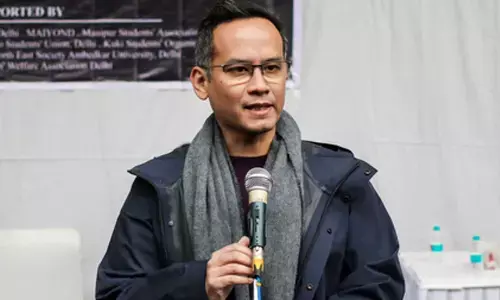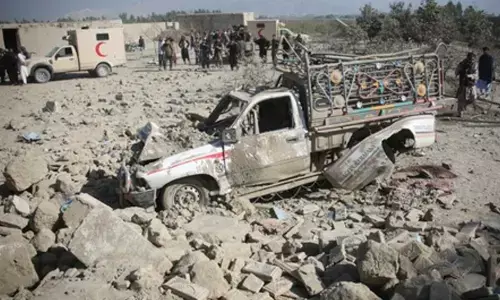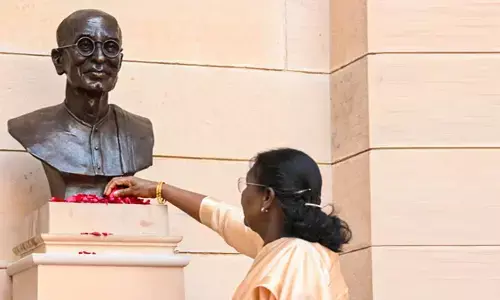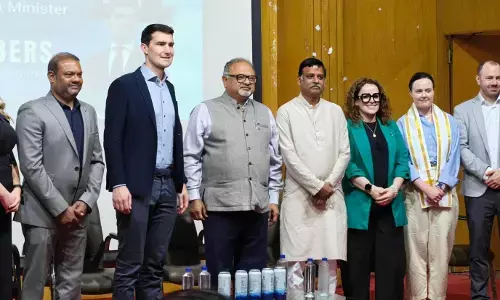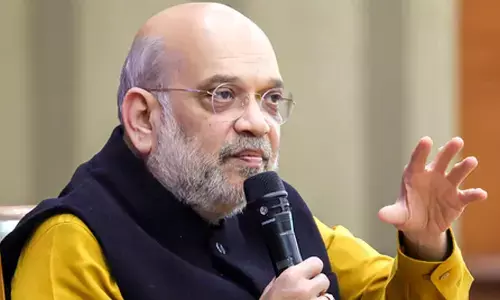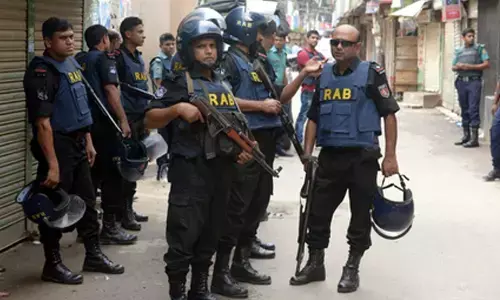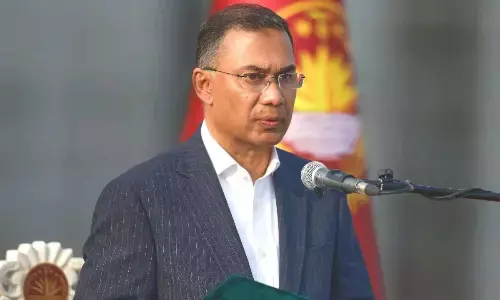Tryst with Delhi

Tryst With Delhi. Moving away from the state government, I joined the Ministry of Energy in the Department of Power in the Government of India on the 8th October 1984.
A shift from Hyderabad to Delhi and joining the Government of India at a time when Delhi was dealing with the aftermath of the assassination of the then Prime Minister Indira Gandhi revealed among other things, the incompetence of the Delhi administration.
.jpg) Moving away from the state government, I joined the Ministry of Energy in the Department of Power in the Government of India on the 8th October 1984. This departure well after one full quarter of the academic year had gone by caused great disruption to my daughter who was in the eighth standard at the time studying at the Hyderabad Public School. Actually my daughter told me in so many words how difficult it would be for her to start all over again in a new place Delhi. The same predicament obtained for my wife, who was teaching at the Hyderabad Public School then. Collateral damage, resulting from the occupational hazards of the father, and the husband!
Moving away from the state government, I joined the Ministry of Energy in the Department of Power in the Government of India on the 8th October 1984. This departure well after one full quarter of the academic year had gone by caused great disruption to my daughter who was in the eighth standard at the time studying at the Hyderabad Public School. Actually my daughter told me in so many words how difficult it would be for her to start all over again in a new place Delhi. The same predicament obtained for my wife, who was teaching at the Hyderabad Public School then. Collateral damage, resulting from the occupational hazards of the father, and the husband!
Hardly had I joined the Government of India I witnessed an event of great magnitude overwhelming Delhi in the aftermath of the assassination on the 31st October 1984 of Prime Minister Indira Gandhi. I heard the news of the assassination even as I entered my office around 9 AM from a colleague in the Ministry of Irrigation and Power. There was a meeting to be attended at the Central Electricity Authority and with the Government withholding an official announcement “business was as usual” i.e., as usual as it could be. The entire atmosphere was surreal with rumours floating all around. A recurring theme that reverberated all around was that the “Sikhs should be taught a lesson”. I heard this from many people. The atmosphere was heavy and there was a complete breakdown of law and order. Such was the incompetence of the Delhi Government that IAS officers including senior joint secretaries and other senior officers working in the government of India had to be pulled out to take care of the Sikh refugees gathered in several make-shift camps! I was one among them. We worked in shifts relieving one another. Such was the casualness of the officers of the Delhi administration that there were often heated arguments between them and the joint secretaries drawn from the Government of India. The Lieutenant Governor (LG) was changed and Cabinet Secretary himself came into the picture with a Control Room in his office. In addition to our work in the relief camps we were attending review meetings with the LG very late in the evenings and once with the Cabinet Secretary himself.
Along with certain other joint secretaries I was assigned to the Shakurpura, Panjabi Bagh camp in shifts. The number of refugees in this camp was about 4, 000 and the issues involved every little but important human need like bread, milk, water, sanitation, medical attention, electricity, clothing, bedding, tents, drugs, glasses, mugs, towels, soaps and security. I am listing all this to highlight the coordination required with various agencies to procure them such as blankets from the Defence depot and tents from the Works and Housing department. There were the inevitable territorial issues like the Delhi Electricity Supply Union (DESU) refusing to repair internal wiring saying that was the job of the CPWD electricians! As someone landing up directly from the field in Andhra Pradesh I could not help the feeling that a few deputy Tahsildars and the district police would have managed such camps superbly, but not the Delhi Administration. To the credit of the All India Institute of Medical Sciences its doctors visited the camp. The Medical Superintendent Dr Safaya himself came accompanied by senior doctors like Dr Sneh Bhargava. Their aid teams stayed long hours and into the night.
There was also the desire of the Administration that all the refugees should return to their homes quickly while the latter were not sure of their security. We had to verify the willingness of the refugees about returning to their places. Human security clearly was the crux of the Delhi riots about which volumes have been written and how grievously the Sikhs suffered. Constantly, suggestions were also being made to us that we should persuade the refugees to move to the Asiad village. There was also the genuine desire to shift the refugees to neighbouring areas like schools to reduce the pressure in individual camps as they faced acute problems of sanitation but that involved fresh logistics.
In the midst of all this was pure politics. One political leader sent blankets and other supplies but they were meant only for his own party people.To ensure that he had his own men!
I wish to say one thing: but for the fact that the Sikhs were a well to do community they could very well have starved for food. To their credit the Sikh community organized food in large quantities and brought it all to the camp. For my own part I kept emphasising to the officers of the Delhi Administration that they needed to be aware of the consequences of disbanding the camp without adequate security for the returning refugees and obtained an assurance from one of the senior most IAS officers of the Delhi Administration that he would take note of it. I have no doubt that other senior IAS officers who supervised the many camps in Delhi including the one of which I was part had taken similar precautions.
Around this time I decided to proceed on study leave to observe how hunger affected the poor in India and what role a subsidized, targeted Public Distribution System (PDS) had in alleviating poverty on its own and in conjunction with rural employment, self-employment and nutrition programmes of the government. Specifically, I wished to study how the PDS was functioning in certain crucial states with high poverty levels like Uttar Pradesh and Bihar in comparison with Kerala, Tamil Nadu, Andhra Pradesh and Karnataka. TL Sankar IAS, among the foremost thinkers in the Andhra Pradesh cadre and a world class expert in Energy and my mentor alongside PS Krishnan and SR Sankaran, guided me to the Centre for Policy Research (CPR), Delhi for undertaking this research. TL Sankar, ever pro-poor, change-driving, rationalist reformer, who nevertheless bore no ill will even against the ultra conservatives, had been one of the few early optimists and supporters of NT Rama Rao’s Two Rupees Rice scheme. I had received considerable guidance and encouragement from him while designing and implementing that scheme. Earlier he had also been the Zonal Manager, FCI, Madras for the entire south while I worked under him as the Senior Regional Manager, FCI, Andhra Pradesh.
Among the foremost policy think tanks of India, the CPR had as its head one of India’s finest social scientists Dr. Viswanath Pai Panandiker (Vissoo) and a conversation between T.L. Sankar and Vissoo saw me join the CPR as a Senior Research Fellow. Vissoo gave me every conceivable freedom in carrying forward my research for the next two years and I further had the extraordinary privilege of having the intellectual company of the last ICS Cabinet Secretary of India, the brilliant Nirmal Mukherji and a passing acquaintance with the former Union Home Secretary L. P. Singh ICS. Nirmal Mukherji had been Cabinet Secretary in Indira Gandhi’s time just a few years earlier and he was particularly affectionate towards me, fascinated by the Andhra Pradesh Two Rupees Rice scheme of which he had heard. He believed in that programme as a necessary strategy for fighting rural poverty. He would hear from me every little detail of this programme and my proposal for how such a subsidized food grains delivery programme could make a dramatic difference if implemented at the all India level combining the Targeted PDS with the National Rural Employment Programme (NREP), the Rural Labour Employment Guarantee Programme (RLEGP) and the consumption credit needed in the Integrated Rural Development Programme (IRDP) with the PDS acting as the conduit for delivering food grains as part wages to the extent of the daily food grains needs, the balance being cash wages, thus providing real wages to the rural poor. Such a PDS would also be the delivery system for the nutrition needs of the Integrated Child Development Services (ICDS) programme and the Mid-Day Meals (MDM) programme as support to school education. Together the volume of the food grains carried to rural India in this productive manner would make the hundreds of thousands of fair price shops viable and employment generating. As I toured the northern and southern states studying their PDS and these other programmes closely, and discussed them in the internal meetings of the CPR, Vissoo and Nirmal Mukherji urged me to complete my book based on this research, to expedite an integrated food security policy for India. The great journalist and editor George Verghese was at this time also a senior fellow at the CPR. He was a generous friend and helped me publish my ideas in the Indian Express through two articles titled “The Andhra Pradesh Rice Scheme”and “Food Grains for the Poor”in the Indian Express. As their titles would show the first article was about the AP Two Rupees Scheme and the latter how we could have a scheme like that for all of India.
Even as I formulated these ideas on what could be done by way of a comprehensive food security programme for the poor in India a wedding reception suddenly brought me face to face with Prime Minister Rajiv Gandhi on the 21st December 1985.


